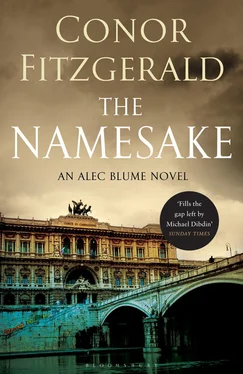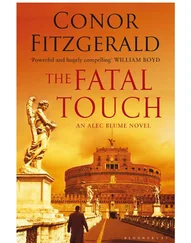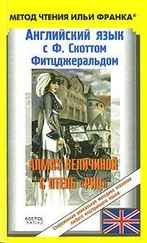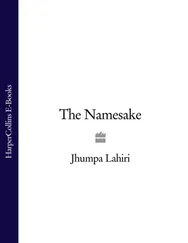Conor Fitzgerald - The Namesake
Здесь есть возможность читать онлайн «Conor Fitzgerald - The Namesake» весь текст электронной книги совершенно бесплатно (целиком полную версию без сокращений). В некоторых случаях можно слушать аудио, скачать через торрент в формате fb2 и присутствует краткое содержание. Жанр: Полицейский детектив, на английском языке. Описание произведения, (предисловие) а так же отзывы посетителей доступны на портале библиотеки ЛибКат.
- Название:The Namesake
- Автор:
- Жанр:
- Год:неизвестен
- ISBN:нет данных
- Рейтинг книги:3 / 5. Голосов: 1
-
Избранное:Добавить в избранное
- Отзывы:
-
Ваша оценка:
- 60
- 1
- 2
- 3
- 4
- 5
The Namesake: краткое содержание, описание и аннотация
Предлагаем к чтению аннотацию, описание, краткое содержание или предисловие (зависит от того, что написал сам автор книги «The Namesake»). Если вы не нашли необходимую информацию о книге — напишите в комментариях, мы постараемся отыскать её.
The Namesake — читать онлайн бесплатно полную книгу (весь текст) целиком
Ниже представлен текст книги, разбитый по страницам. Система сохранения места последней прочитанной страницы, позволяет с удобством читать онлайн бесплатно книгу «The Namesake», без необходимости каждый раз заново искать на чём Вы остановились. Поставьте закладку, и сможете в любой момент перейти на страницу, на которой закончили чтение.
Интервал:
Закладка:
The woman had turned up four times in a row and stood waiting at the bus stop with Teresa. They could be seen chatting a little. She was always there at the same time as Teresa. Possibly they chatted in the bus together. Together, they watched new video footage from the San Donato metro station, the terminus of the number 45 bus. Teresa got off several stops before the end of the line, but the woman, along with other passengers on their way to the metro station, stayed on to the end.
The police had put in the hours and expertise to filter down the video to one telling moment. Helped by the absence of commuters and traffic in August, they had captured a video feed of the woman getting off the bus at the metro station, then, instead of taking the metro or another bus, she got into a car, which resembled the one Teresa was to climb into a few days later. The car could be clearly seen turning and heading back in the direction the woman had just come from. Again, the number plate proved elusive.
‘She did not need to make that bus journey,’ said the magistrate. ‘She got on that bus specially to be with Teresa.’
The inspector nodded in agreement. ‘We’re checking other cameras for that car. Eventually we’ll find it.’
‘What were Resca’s articles about?’
‘Money laundering, construction companies and the financial crisis.’
‘And he loses his child for that?’
‘Giovanni Resca wanted his voice to be heard. He wanted people to read his articles and hear his truth. Now, with politics on vacation, every national newspaper and even the foreign press are following this story, and linking it to Resca’s articles, talking about his shows and his leftist politics. He got the fame he wanted and lost his child.’
‘We can’t find any connection to the woman. No one has any idea of who she might be,’ said the inspector.
‘That’s because she is no one. Let’s say you want to abduct an innocent but not stupid girl in broad daylight, how do you do it? First, you send a woman. This woman casually stands at the bus stop and strikes up conversation, almost certainly about how slow the bus is in coming. They get on, Teresa gets off, and the woman stays on board. A few stops later, the woman gets off and is picked up by her accomplices. Next time Teresa’s at the bus stop, there’s the woman again: more friendly conversation. Now Teresa knows the woman gets off at a later stop. One more meeting, more friendly conversation, by now they may be on first-name terms. Then, in for the kill. The woman is there chatting away, a car pulls up, and, why, a stroke of luck, it’s a friend who has spotted her there at the bus stop, offers her a lift home. The woman accepts and is halfway into the car when — where are her manners? — she extends the offer of a lift to Teresa. The driver, a friendly type, could even be another woman, has no problems with this: they’re going past Teresa’s house anyhow, as Teresa knows. In she gets. Fourteen years old, never harmed anyone, still full of trust and hope.’
14
Resca, G. (2009, July 30).
How the Ndrangheta saved the banks: an analysis by Giovanni Resca, Il Manifesto, pp. A1, A6
OSINT stands for Open Source Intelligence. It refers to the sort of information you can pick up in the public domain just from reading government papers, chamber of commerce records, company balance sheets, newspaper articles, planning permission applications, land rezoning agreements and local news. It is what we journalists used to do all the time, but now we prefer to be spoon-fed, and like fat, coddled toddlers, we accept digestible pap from the corporations and government. But who makes the pap? Someone has to produce it, and make it easily digestible and even tasty for a gullible public. The pap-makers may deserve censure for what they do, but they are today’s true journalists. Often venal, calculating and dishonest, always inventive, they are the great storytellers of our time. First, they plant their memes, their exposes, distractions, half-truths or downright lies, then they build a narrative around them. They are the world’s secret artists.
The trick in OSINT is self-reference. You create a news story that is completely or partially made up, then you circulate it quietly until it is picked up by someone else. You bide your time until it goes viral or simply becomes part of the background noise. The important thing is it must no longer have a single identifiable source. You let the Chinese-whisper effect distort some of the details of the story, then you pick it up again and bring it to prominence attributing it to others. That’s how most of the Iraq WMD stories were created. This is the storytelling skill. But, and this is the mistake that many of us on the Left often make, not all OSINT is false. On the contrary, most of it is true, for otherwise it would not work. The trick is to weave separate threads into a convincing fable. As in advertising and publishing, two other meretricious pursuits, the hardest part of OSINT is making sure that it’s your story and not someone else’s that gets out there.
Borrowing from the OSINT experts, then, I should like to propose my own version of recent economic developments. Using open sources, I have looked at the events since the collapse of Lehman Brothers and drawn some inevitable conclusions. Unlike many of my colleagues, particularly those who work for Berlusconi, I want to make full disclosure at the outset, and say that the reason I am telling this story, which is a true one, is that I want the Ndrangheta to become known. I want to publicize the name. I want the organization to become as notorious and ill-famed as Cosa Nostra. I want to put them in the limelight so that that part of the state they do not yet control might wake up and do battle.
As the readers of this newspaper know, capitalism needs a lot of propping up. It always has. Most of the direct support is through military spending, but capitalism can also rely on the public to provide collateral when things get tough. When billions are being made (but not distributed), the public is told capitalism works; when billions are being lost, the public is told it needs to pay up to rescue capitalism, because only capitalism works.
Sometimes plutocrats dispense with the effort of intellectual justification. They simply back capital accumulation with military force and the constant threat of violence, and kill those who resist. This is how it works in Russia, Albania, Bulgaria, Romania and most of Italy. We call it the Mafia, but we could just as easily call it deregulation. The only difference is the veneer of legitimacy.
But it is an important difference. For capitalism to appear legitimate, people must keep believing that it works. So when it stopped working, when people realized the banks didn’t trust one another enough to lend, capitalism faced an existential threat. The whole money supply — the whole concept of money itself was on the brink of becoming a story in which no one believed.
In the USA, the Treasury Department introduced quantitative easing. Likewise, in the UK — basically, they printed money, and put off the day of reckoning. In Italy, Berlusconi said the banks were fine, and threw parties in his Sardinian villa. But for a few nights, before the institutions could react, before the trillions were pledged by western governments, there was a risk that ATM machines would stop paying out. Banks needed cash, and they needed it quickly.
Now what sort of organization has a whole load of cash, serious cash, billions upon billions in banknotes — enough to make a difference for a few vital days? The answer comes spontaneously: organized criminals. Specifically, the Russians and the Ndrangheta. There were others, too, but these two had more cash than anyone else. The Ndrangheta needs to burn through its money. Cosa Nostra, an older organization, has interests, contacts, influence, clout and a certain establishment respectability by now, because it has so many non-cash assets. The Ndrangheta is flush with cash. In fact, it has too much, and needs to convert it into capital investments.
Читать дальшеИнтервал:
Закладка:
Похожие книги на «The Namesake»
Представляем Вашему вниманию похожие книги на «The Namesake» списком для выбора. Мы отобрали схожую по названию и смыслу литературу в надежде предоставить читателям больше вариантов отыскать новые, интересные, ещё непрочитанные произведения.
Обсуждение, отзывы о книге «The Namesake» и просто собственные мнения читателей. Оставьте ваши комментарии, напишите, что Вы думаете о произведении, его смысле или главных героях. Укажите что конкретно понравилось, а что нет, и почему Вы так считаете.












